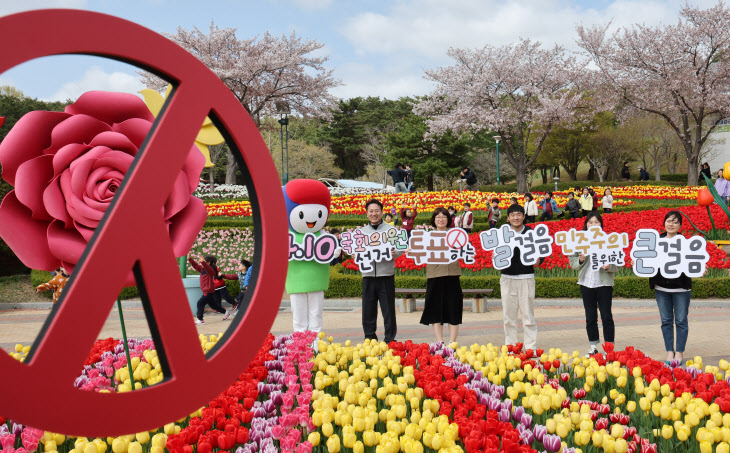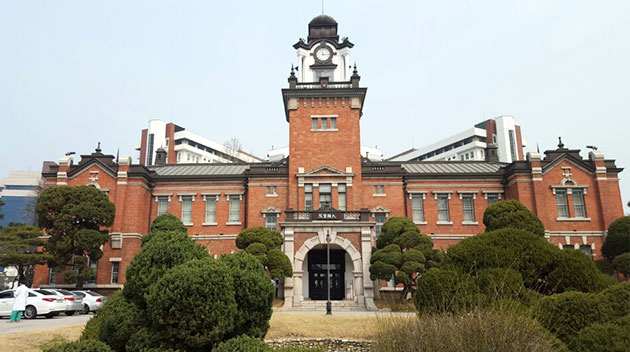
지난 10일 치러진 제22대 총선에서 더불어민주당이 254석 가운데 161석을 차지하며 단독 과반을 달성하는 등 범야권이 압도적인 승리를 거뒀다.
11일 중앙선거관리위원회에 따르면 이날 오전 10시 25분 전국 개표율이 100% 완료된 상황에서 집권 여당인 국민의힘은 지역구 90석을 얻는데 그쳤다. 새로운미래, 개혁신당, 진보당이 지역구에서 각각 1석을 차지했다.
비례대표의 경우 46명의 당선자가 정해졌다. 국민의힘의 위성정당인 국민의미래 18석, 더불어민주당의 연합 위성정당인 더불어민주연합 14석, 조국혁신당 12석, 개혁신당 2석으로 결정됐다.
지역구와 비례대표를 더한 의석 수는 ▶더불어민주당+더불어민주연합 175석 ▶국민의힘+국민의미래 108석 ▶조국혁신당 12석 ▶개혁신당 3석 ▶새로운미래 1석 ▶진보당 1석이다.
윤석열 대통령은 11일 여당이 참패한 이번 총선 결과에 대해 “총선에 나타난 국민의 뜻을 겸허히 받들어 국정을 쇄신하고 경제와 민생 안정을 위해 최선을 다하겠다”는 입장을 이관섭 대통령 비서실장의 대통령실 브리핑을 통해 밝혔다.
이어 한덕수 국무총리는 참패의 책임을 지고 윤 대통령에게 사의를 표명했다. 대통령 비서실장·정책실장·수석비서관 전원도 사의 의사를 밝혔다. 한편 국민의힘 한동훈 비대위원장 역시 총선결과에 책임을 지고 사퇴했다.
국민의 민심이 여권의 ‘정권 심판론’에 대한 결과라는 점에는 이견이 없으나, 민주당의 압도적인 승리에 대해서는 해석이 엇갈리는 상황이다. CBS 김현정의 뉴스쇼와 인터뷰한 이언주 더불어민주당 당선인은 “분명히 정권 심판의 어떤 민심, 이것은 굉장히 컸던 것 같긴 한데 그럼에도 불구하고 완전히 원사이드하게 몰아주거나 또는 압도적으로 몰아줘서 이렇게 좀 교만해질 수 있는 그리고 한쪽이 이렇게 완전히 폭주할 수 있는 그런 가능성, 이런 것들은 또 적당히 견제가 된 것 같은 그런 결과인 것 같습니다.”라고 총선을 분석했다.
양 거대 정당의 결과 외에도 이번 총선에 돌풍을 일으켰던 조국혁신당은 비례대표만으로 12석이라는 성적표를 받았다. 조국혁신당의 조국 대표는 첫 번째 발의 법안으로 한동훈 위원장에 대한 특검을 발의하겠다고 밝혔다.
한편 국민의힘 당대표 출신인 개혁신당 이준석 대표가 화성을 지역구에서 당선되며 기적에 가까운 이변으로 꼽혔다. 비록 마지막에 가까스로 비례대표 이주영, 천하람을 포함해 총 3석 확보에 그쳤으나 전국적 지명도를 가지고 있는 이대표의 극적인 승리로 대권 후보급으로 발돋움하며 프랑스의 젊은 정치인 ‘마크롱’과 비견하며 자평했다.
총선에서 주목해 볼만한 점으로 더불어민주당은 박지원, 정동영 등의 ‘올드보이’가 다시 국회에 입성했고, 국민의힘은 30대 김재섭 후보가 전통적 민주당 지지 지역인 도봉갑에서 당선되었다. 제3지역의 개혁신당 역시 3명의 당선자들 모두가 80년대 생이다.
S. Korea, 4-10 General election Democratic Party 161 seats, People Power Party 90 seats…
The 22nd general election held on Tuesday saw a landslide victory for the broad opposition, with the Democratic Party of Korea (DPK) winning 161 of the 254 seats in the National Assembly to form a sole majority.
According to the National Election Commission, the People’s Power Party (PPP) won only 90 seats in the regional districts as of 10:25 a.m., with 100 percent of the nationwide vote counting completed. The New Future, Reform Party, and Progressive Party won one seat each.
With proportional representation, 46 winners were determined. The People’s Future, a satellite party of the PPP, won 18 seats, the Democratic Alliance, a coalition satellite party of the Democratic Party, won 14 seats, the Rebuilding Korea Party won 12 seats, and the Reform Party won two seats.
The total number of seats based on regional districts and proportional representation is 175 for the DPK + Democratic Alliance, 108 for the People’s Power Party + People’s Future, 12 for the Rebuilding Korea Party, 3 for the Reform Party, 1 for the New Future, and 1 for the Progressive Party.
“We will humbly accept the will of the people expressed in the general election and do our best to renew the national government and stabilize the economy and people’s lives,” President Yoon Suk-yeol said in a presidential office briefing by presidential press secretary Lee Kwan-seop, in response to the PPP’s crushing defeat.
Prime Minister Han Deok-soo then took responsibility for the catastrophic defeat and offered his resignation to President Yoon. The presidential secretary, policy chief, and chief of staff also announced their resignations. Meanwhile, PPP’s Chairman Han Dong-hoon also took responsibility for the election results and resigned.
While there is no disagreement that the public sentiment was a result of the ruling party’s “regime judgment theory,” there are mixed interpretations of the Democratic Party’s landslide victory. In an interview with CBS’s Kim Hyun-jung’s news show, Lee Eun-joo, an elected person of the DPK, analyzed the election by saying, “Obviously, there was a certain public sentiment of regime judgment, which was very large, but nevertheless, it seems to be a result of such a possibility that it could be completely one-sided or overwhelmingly driven, so that one side could become a little arrogant and one side could completely run away like this, and these things were also moderated.”
In addition to the results of the two major parties, the Rebuilding Korea Party received 12 seats under proportional representation. Cho Kuk, the leader of the Rebuiding Korea Party, announced that his first bill would be a special prosecution of Chairman Han Dong-hoon.
Meanwhile, Lee Jun-seok of the Reform Party, a former representative of the People’s Power Party, won the Hwaseong district in what was considered a miraculous upset. Although the party only secured a total of three seats, including proportional representatives Lee Joo-young and Cheon Haram, Lee’s dramatic victory catapulted him to the level of a presidential candidate, drawing comparisons to young French politician Macron.
In the general election, the Democratic Party of Korea saw ‘old boys’ such as Park Ji-won and Jeong Dong-young return to the National Assembly, while the People’s Power won in Dobongap district, a traditionally Democratic area, with Kim Jae-seop, a candidate in his 30s. In the third region, the Reform Party also had three winners, all of whom were born in the 80s.

![[Milestone] Korean Beauty & Cosmetic wholesalers](https://milestonekorea.files.wordpress.com/2024/04/ec8aa4ed81aceba6b0ec83b7-2024-04-24-ec98a4eca084-10.24.00-1.png?w=1024)
![[Milestone] Korean Accessories Wholesalers](https://milestonekorea.files.wordpress.com/2024/04/ec8aa4ed81aceba6b0ec83b7-2024-04-23-ec98a4ed9b84-3.11.02-1.png?w=1024)


Leave a comment